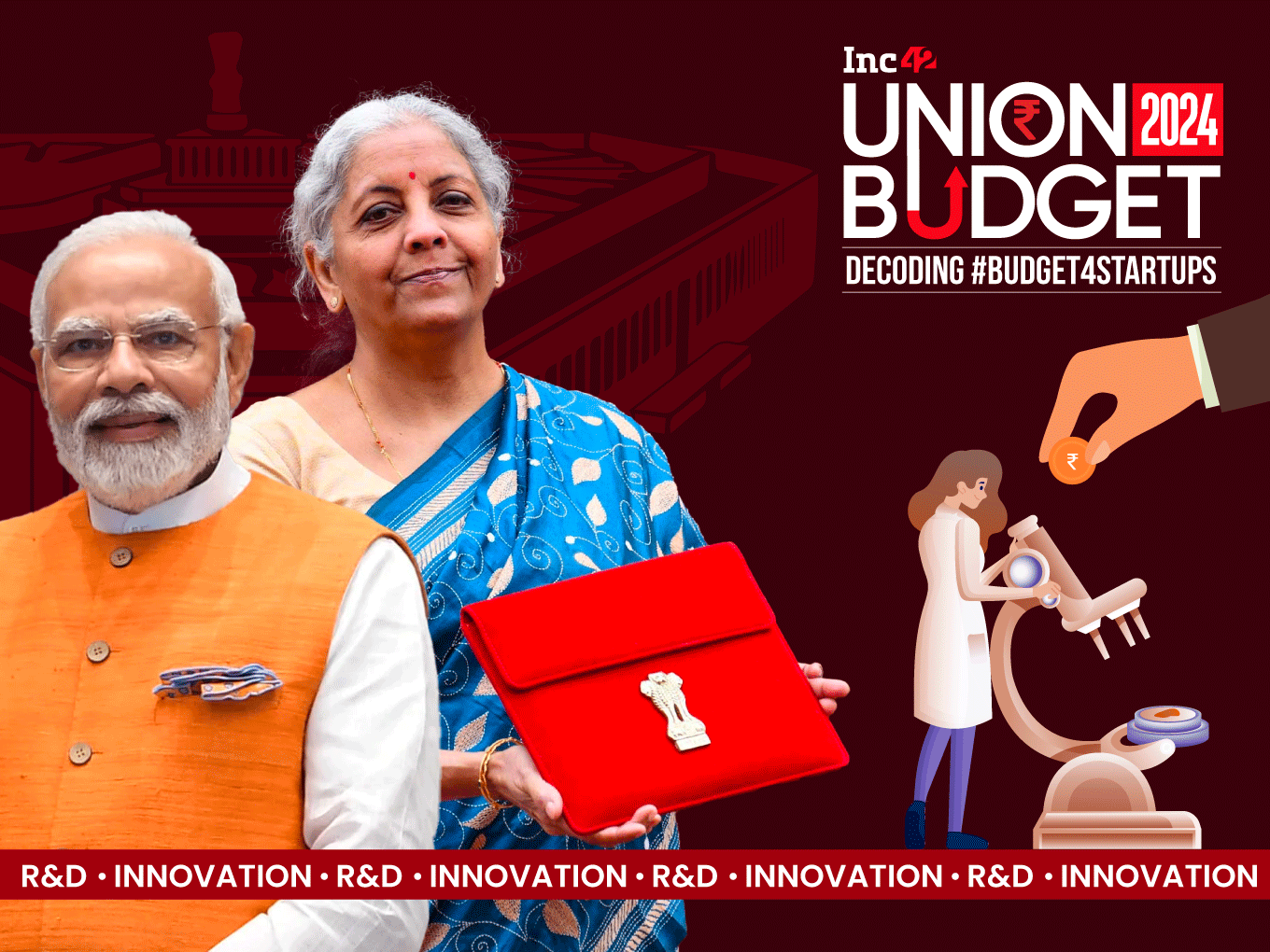Budget 2024: Can The R&D Push Transform India Into A Product-Led Economy?

Research and development (R&D) grabbed the spotlight as finance minister (FM) Nirmala Sitharaman presented the Union Budget 2024-25. The FM announced a slew of sops to spur research and innovation in the private sector.
Putting the R&D push in full throttle, Sitharaman said that the government will operationalise the INR 1 Lakh Cr Anusandhan National Research Fund in this fiscal. The fund, as per the FM, will look to incentivise basic research and prototype development in the country.
Announced during the interim Budget in February, the fund will offer interest-free loans for a tenure of 50-years to finance long-term research and innovation in sunrise domains.
In her seventh consecutive Budget speech, Sitharaman said that the government will set up a mechanism to fuel private sector-driven research and innovation at commercial scale with the financing pool of the Anusandhan Fund.
On top of that, she announced an INR 1,000 Cr venture capital (VC) fund that will invest in homegrown spacetech startups.
The FM also said that the government will provide funding in “challenge mode” to R&D-focussed agritech startups to shore up the nation’s agriculture sector.
“Our government will undertake a comprehensive review of the agriculture research setup to bring the focus on raising productivity and developing climate resilient varieties. Funding will be provided in challenge mode, including to the private sector. Domain experts both from the government and outside will oversee the conduct of such research,” added Sitharaman.
The announcements were welcomed by the country’s startup ecosystem, which lauded the government’s focus on building a more research-oriented and innovation-driven product economy.
R&D Push Gets A Big Thumbs Up
Speaking with Inc42, Manoj Agarwal, managing partner at deeptech VC firm Seafund, said, “As a deeptech-focussed VC fund, (we think) FM announcing INR 1,000 Cr space economy VC fund and R&D fund of INR 1 Lakh Cr will work as a strong catalyst for startups in deeptech and spacetech.”
Echoing similar sentiment, Hyderabad-based incubator T-Hub’s CEO Mahankali Srinivas Rao said, “This fund (INR 1 Lakh Cr) will power basic research and prototype development, driving commercial-scale innovation and enabling startups to bring cutting-edge solutions to the market.”
However, healthtech startup NeuroEquilibrium’s founder Rajneesh Bhandari said it is essential to ensure that these funds are easily accessible to startups and not “bogged down” by bureaucratic hurdles.
Deepak Gupta, general partner at WEH Ventures, told Inc42 that the R&D spending in the country has not grown commensurately with GDP growth. As such, the INR 1 Lakh Cr fund has the potential to spur the local innovation ecosystem.
For context, as per government data, India more than doubled R&D spending to INR 1.27 Lakh Cr in 2021 compared to INR 60,000 Cr in 2011. However, the picture becomes bleak in terms of percentage, as spending on R&D fell from 0.76% of the GDP to 0.64% in 2021.
Seafund’s Agarwal believes that the R&D-focused announcements in the Budget can push the country in the direction of a product-led economy.
However, an investor, who didn’t want to be named, said while the Budget announcements are in the right direction, the goal of a product-led economy is still a long way off.
“The Budget does not solve this issue (low R&D spend) entirely… We need the best quality professors and equipment to build a research-led academia. While many of the professors and candidates are doing that in India at many universities, it will take a few years for that effect to trickle down and lead the country on the path of building world-class products,” said the investor.
Centre Banking On Trickle-Down Effect
Industry players believe that the FM, with the announcements, is looking to foster a larger innovation ecosystem where many can benefit in a symbiotic manner.
Warehouse automation startup Control One AI’s founder and CEO Pranav S believes that the R&D fund will also be impactful for the AI sector and will open up new avenues for accessing cutting-edge technologies.
Another industry founder said that both the “patient capital” as well as the spacetech funds will help startups across various domains explore synergies and leverage aspects such as talent and IP creation and build state-of-the-art local facilities.
However, issues remain. The FM said that the INR 1 Lakh Cr R&D fund will also be utilised for spurring research in the nuclear energy sector to set up Bharat Small Reactors and develop Bharat Small Modular Reactor as well as newer technologies for nuclear energy.
The nuclear sector is capex heavy and grapples with challenges such as scalability and commercialisation. Additionally, there are quite a few homegrown startups in the nuclear energy space, like HYLENR and Avasarala Technologies. As such, there are some concerns that the nuclear energy sector may end up utilising a large chunk of the fund.
However, it is pertinent to mention there is no clarity yet on how the R&D fund will be utilised. Most stakeholders from the startup ecosystem expect it to be deployed in a Fund of Funds (FoF) fashion to reach the desired applicants.
While the Centre has taken a major step towards pushing R&D, the onus is now on the startup ecosystem to leverage this pitch and turn the country into a product-led nation.
The post Budget 2024: Can The R&D Push Transform India Into A Product-Led Economy? appeared first on Inc42 Media.
No comments